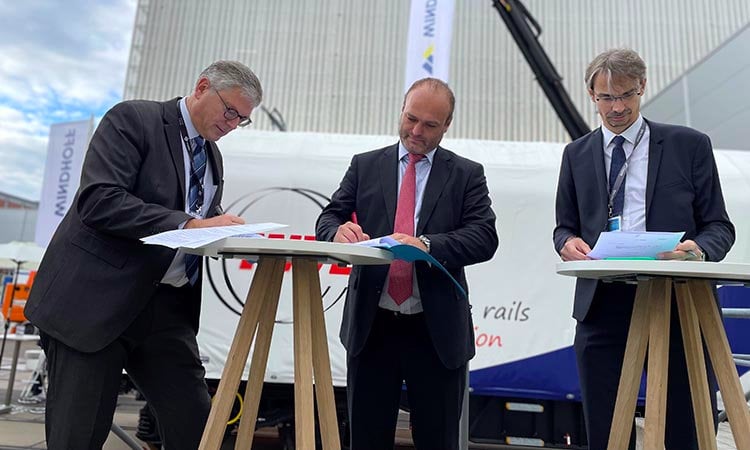railway-international.com
02
'23
Written on Modified on
ERMEWA, INVEHO AND IRT RAILENIUM LAUNCH INNOVATION PROJECT M4.0
With the M4.0 project, three leading players in rail freight transport have set themselves the goal of advancing condition-based and predictive maintenance.

From left to right: Peter Reinshagen (Managing Director Ermewa SA) – Julien Mathiaud, (Managing Director INVEHO) – Bertrand Minary, (CEO IRT Railenium) – photo credit Railenium
ERMEWA SA, INVEHO and IRT Railenium have set up their joint research and innovation project Maintenance 4.0 (M4.0). The contract was signed at InnoTrans 2022 in Berlin. The teams of experts have started to work on the first research packages.
Improving the safety, reliability, and availability of rolling stock through efficient processes is the overriding goal of this innovation project. The focus is on substantially cutting the TurnAround Time (TaT), meaning the period between a wagon is taken out and reintegrated into the transport process. Reducing this TaT will contribute significantly to boosting the operational efficiency of rail freight supply chains.
In jointly defined work packages, the partners involved will bring together knowledge and experience from practice and academic research work. They deal with topics such as energy management, data acquisition, definition and testing of wear models, failure scenarios and testing.
The project will make an important contribution to increasing efficiency in rail freight transport. It thus fits perfectly with the sector’s goals in Europe: to double rail freight’s share of traffic to 30% by 2030. The climate targets of the European Green Deal cannot be achieved without this shift to rail.
ERMEWA SA, INVEHO and IRT Railenium have set up their joint research and innovation project Maintenance 4.0 (M4.0). The contract was signed at InnoTrans 2022 in Berlin. The teams of experts have started to work on the first research packages.
Improving the safety, reliability, and availability of rolling stock through efficient processes is the overriding goal of this innovation project. The focus is on substantially cutting the TurnAround Time (TaT), meaning the period between a wagon is taken out and reintegrated into the transport process. Reducing this TaT will contribute significantly to boosting the operational efficiency of rail freight supply chains.
In jointly defined work packages, the partners involved will bring together knowledge and experience from practice and academic research work. They deal with topics such as energy management, data acquisition, definition and testing of wear models, failure scenarios and testing.
The project will make an important contribution to increasing efficiency in rail freight transport. It thus fits perfectly with the sector’s goals in Europe: to double rail freight’s share of traffic to 30% by 2030. The climate targets of the European Green Deal cannot be achieved without this shift to rail.
www.ermewa.com

